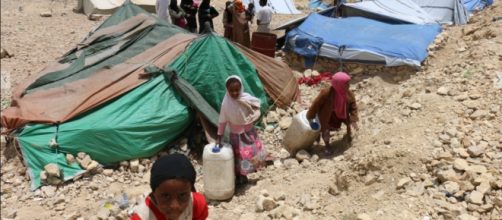Five-year-old Rahma and her family took shelter along with others in a school in Tahrur, a village near to Aden, in the south of Yemen. They fled of the clashes between the Houthi rebels and the militar coalition lead by Saudi Arabia, which was supporting to Yemeni Government of Abdo Rabbo Mansour Hadi.
The president had left Yemen on March 25 for seeking help in the neighbour country. That day, Riyadh started the leadership of theairstrikes against the Houthi insurgency, who hadtaken the capital, Sana, in September, in the middle of the demonstrations over thedrop of the subsidy of combustible.
Since then, the conflict escalated.
The familieswho were in the school trusted inthe safety of the place, but the bombs began to fall from the skyand killed 10 Rahma's relatives,including her mother and her cousins. 'Why did they bomb us?', asked the girl to her aunt Salama. However, the woman, who would regret not to have died with her daughters,had noanswer for her.
The Rahma's story, gathered by Amnesty International, is just one more of theshocking episodes happened since the House of Saud initiated the bombings, with the approval of the United States.It points out how thebelligerent parts in the Yemeni conflict have failed inthe war laws.
Schools, hospitals, markets, mosques and other civilians infrastructures have been targeted by both sides, especially by the coalition.
This repeated Human Rights violation involves just the opposite of protecting civilians and has leadthe General Secretary of UN, Ban Ki Moon, to describe Yemen as a country "in flames" and "awashwith weapons"
“We need states that are party to [the] arms trade treaty to set an example in fulfilling one of the treaty’s main purposes – controlling arms flows to actors that may use them in ways that breach international humanitarian law”, has requested.
Cessation of hostilities
On Wednesday, the UN special envoyfor Yemen, Ismail Ould Cheikh Ahmed, welcomed the agreement of the cessation of hostilities. The deal will come into force on Abril 10, eight days before of the scheduleddate in Kuwaitto restart the peaceconversations.
The diplomat emphasised that the face-to-facenegotiations will provide a mechanism for a return to a peaceful and orderly transition, in accordance with UN Security Council resolution 2216.The envoy further explained that the talks will focus on five main areas: the withdrawal of militias and armed groups, the handover of heavy weapons to the State, interim security arrangements, the restoration of state institutions and the resumption of inclusive political dialogue, and the creation of a special committee for prisoners and detainees.
The fights, the attacks against civilians, the blocking of the aid, the expansion of Al Qaeda in the Arabian Peninsula in the centre and the southeast of the countryand the factthat Yemen is the poorest country in the region, even since before the conflict, results in nearly 2,5 millions ofinternally displaced people, morethan 3.000 deaths and 83% of the population in need of humanitarian assistance, including food, water, shelter, fuel and sanitation.

